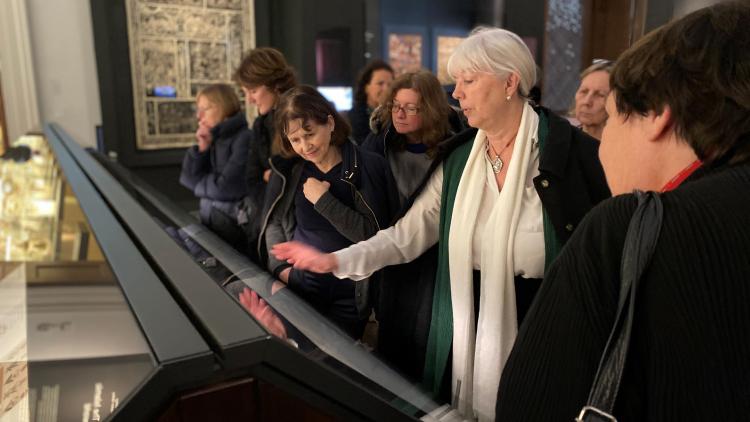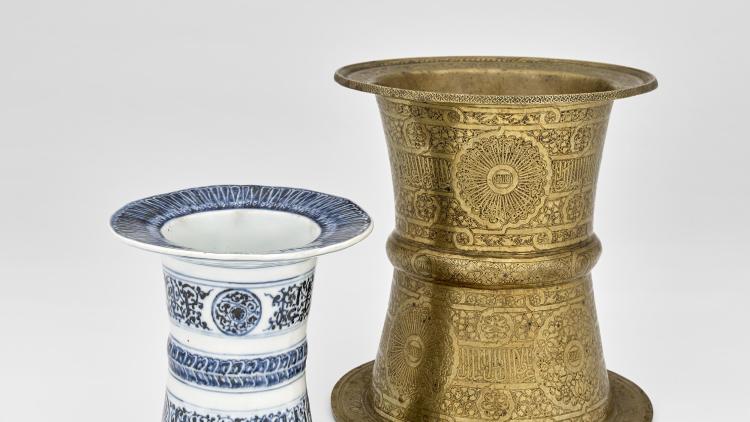MPhil/PhD in Chinese and Inner Asian Studies



Key information
- Duration
- 3 years full-time or 6 years part-time
- Attendance mode
- Full-time or part-time
- Location
- On campus
- Fees
-
Home (full-time): £4,860 per year
International (full-time): £23,390 per year - Entry requirements
-
We normally require a 2.1 bachelor's degree (or its equivalent) plus a Masters degree in appropriate subject area plus one reference. In exceptional cases we may accept applicants who do not meet these criteria if they show evidence of a strong Masters degree and/or appropriate level of relevant work experience. International applicants should also see Doctoral School English language requirements
Course overview
The China and Inner Asia Department is able to supervise MPhil and PhD degrees by research and thesis in a wide range of cultural and linguistic subjects.
Intending research students should not feel constrained to limit their choice of topics to those indicated against the names of current staff members (postgraduate students have recently been working on such diverse topics as colour symbolism in ancient Chinese texts, Chinese cinema, and Chinese Braille systems, and translation studies).
If necessary, arrangements can be made for joint supervision with teachers from other departments of SOAS. Research undertaken at MPhil and PhD level is based on literary, documentary, and archive materials in the languages of the area and/or on fieldwork conducted in those languages.
Our alumni are to be found in academic and government posts, journalism and other media, museums, art galleries, aid agencies, libraries, charities, medicine, and large and small businesses of many kinds all over the world, and a large number of them work in the area or in the cultural field of their studies.
Why study Chinese and Inner Asia Studies at SOAS?
- We are ranked 12th in the UK for Modern Languages (QS World University Rankings 2023)
- we have a range of expertise at SOAS, not only in East Asian studies, but also with regard to languages and literatures of other regions - unique in UK institutions
- we offer strong interdisciplinary support and have great facilities, such as a multimedia suite, a radio station and a satellite access to a wide range of world television. Our Library houses a major collection of digital and paper resources, with books and journals on China-related issues that scholars from all around the world travel to consult.
Structure
All students register in year 1 of the programme as MPhil students. The upgrade from MPhil to PhD takes place at the end of the first academic session for full time students (or at the end of the second academic session for part time students).
All new MPhil/PhD students are provided with a supervisory committee of three members, comprising a main or primary supervisor, and a second and third supervisor. The split in time commitment across the supervisory committee is 60:25:15. In the first year students are expected to meet their main supervisor on a bi-weekly basis for a period of at least one hour.
The student’s primary supervisor is always a member of the Department in which the student is registered. The second and third supervisors, who act in a supplementary advisory capacity, may be from the same Department, or other Departments/Centres in the Faculty of Languages and Cultures or in Departments/Centres in the other Faculties of the School.
Depending on the nature of the research, joint supervision is sometimes recommended, under the direction of two primary supervisors. In such cases the student has only one further supervisor on their committee.
The student’s progress is further overseen by a Departmental Research Tutor.
Year 1
In the first year, students prepare for research by following a research training seminar series (RTS) convened at the Faculty level by the Associate Dean for Research and supported by the generic training on offer in the Doctoral School.
Students working in the fields of literature and cultural studies are also invited to participate in the additional training offered in the Centre for Cultural, Literary and Postcolonial Studies (CCLPS).
Students may also be encouraged by supervisors to attend additional taught courses relevant to their research and to their training needs. These may include specialist disciplinary, language or regional culture courses or research training in other Departments outside the Faculty.
In term 3, year 1 full time students (year 2 for part time students) are required to submit a core chapter (of about 10,000 words) and research proposal (of about 2,000 words) by 15 May each year.
Core chapter
The core chapter is a specimen of analytical writing which is to form an integral part of the PhD dissertation. This chapter should present an argument and demonstrate an actual application of a clearly-articulated methodological framework to the primary sources under investigation.
Research proposal
The research proposal typically includes the following elements:
- Research rationale and context of proposed research
- Main research questions
- Literature review
- Theoretical and methodological framework and considerations
- Proposed research methods
- Ethical issues (where applicable)
- Outlining structure of PhD dissertation
- Schedule of research and writing
- Bibliography (excluded from work count)
Adjustments to one or more of these sections, including additions or deletions where appropriate, are possible by prior arrangement between the students and lead supervisors.
The upgrade process from MPhil to PhD status is based upon an assessment of the core chapter by the student’s research committee, and upon on a 20-30 minute oral presentation, followed by a discussion.The oral presentation is given to Departmental staff and research students and all supervisory committee members are present.
The supervisory committee then discusses the student's performance afterwards in a more focussed meeting. On successful completion of the extended proposal, students are formally upgraded to PhD and proceed to the second year. (If the assessors consider there to be shortcomings in the upgrade proposal, students will be asked to revise it to their satisfaction before the upgrade to PhD status can be confirmed.) Students are not normally permitted to proceed to the second year until the upgrade process has been completed.
Year 2
The second year (or part time equivalent) is normally spent engaged in research. This may be by any combination of fieldwork and research in libraries and material collection as agreed between the student and the supervisor(s).
Year 3
The third year (or part time equivalent) is devoted to writing up research for the PhD thesis. During this time, students will normally give a presentation in a research seminar organised by the Departmental Research Tutor, comprising a select number of staff members with special expertise in the topic and other research students. During the third year (or part time equivalent) students will present draft chapters to their main supervisor for comment, before completing a final draft of the thesis.
Once a full draft is complete, the work is assessed by all members of the supervisory committee and the student can either submit the thesis or move on to Continuation Status to be given a further 12 months to complete the thesis and submit for examination. The thesis must be completed within 48 months from the time of registration (or part time equivalent).
The thesis – not to exceed 100,000 words in length - is examined by two leading authorities in the field, between them the nominated examiners should demonstrate strong experience of research degree examining in the UK and the University of London and be able to provide clear independent external oversight. If neither examiner has University of London experience, a Chair may be required.
PhD Degrees are awarded by SOAS from registration in 2015 and are subject to SOAS regulations.
Important notice
The information on the website reflects the intended programme structure against the given academic session. The modules are indicative options of the content students can expect and are/have been previously taught as part of these programmes.
However, this information is published a long time in advance of enrolment and module content and availability is subject to change.
Teaching and learning
Academic staff and their research areas
- Dr Cosima Bruno BA (Venice), PhD (London) - Contemporary Chinese literature; translation studies; intermedial poetry, Sinophone and bilingual poetry
- Dr Nathan W. Hill AM AM PhD (Harvard) - Tibetan language from Old Tibetan to Modern Standard Tibetan; Tibetan historical and biographical literature; historical, descriptive and corpus linguistics, in particular with reference to Tibetan or other Tibeto-Burman/Sino-Tibetan languages; Chinese minorities; Mongolian
- Dr Xiaoning Lu BA (Nanjing), MA (Fudan), PhD (Stony Brook) - Chinese-language cinemas, film history and criticism, global socialist culture, and Chinese popular culture.
Recent research theses
- Dylan K. Wang, Unto Myself Reborn: Self Translation in Modern Chinese Literature
- Mia Chen Ma, Risk, Failure, and Liquid Modernity: Ecocriticism in Chinese Science Fiction
- Feifei Zhan, Pain, Mother-daughter Relationship and Subjectivity in Post 1980 Fictions by Chinese Women Writers, awarded in 2023
- Fang Wan, Power and Ambiguity: Writing about Strong Woman on Jinjiang Literature City
- Serafina Aquilino, Virtual Language: The Use of Chinese Language in Electronic Literature and Its Influence in Chinese Popular Culture
- Pamela Anne Hunt, Configurations of Masculinity and Realms of Agency in Post-89 Chinese Urban Fiction
- Alastair Morrison, ‘Farewell to History’: New Historical Fiction’s Alternative Vision of the 20th Century China
- Eddie Bertozzi - One Step Forward into Reality - Transvergent Reconfigurations of the Jishizhuyi Style in Contemporary Chinese Cinema
- Katherine Foster - Child of Sorrow: Children and Childhood in Late Twentieth Century Chinese Fiction
- Jung Eun Jo - Analysis of the Discourse on Music of the Lüshi chunqiu mainly in comparison with the "Yuelun" chapter of the Xunzi
- Wing Sze Kaby Kung - From Feminism to Postfeminism: A Feminist Study of the Works by Hong Ying and Li Bihua
- Alastair Morrison - 'Farewell to History': New Historical Fiction's Alternative Vision of the 20th century China
- Yiming Shen - Chinese Islamic text studies in the seventeenth and eighteenth centuries: A case study of Chinese translations of Jāmī’s Persian Sufi prose
SOAS Library
SOAS Library is one of the world's most important academic libraries for the study of Africa, Asia and the Middle East, attracting scholars from all over the world. The Library houses over 1.2 million volumes, together with significant archival holdings, special collections and a growing network of electronic resources.
Employment
Graduates from the Department of East Asian Languages and Cultures develop competencies in intercultural awareness, analysis and communication. Demand for specialists with advanced proficiency in the languages of China, Japan and Korea has significantly increased in recent years, and graduates with these skills are highly sought after by employers.
Recent graduates have been hired by organisations including:
- Accenture
- Amazon
- Bloomberg LP
- Department for Work and Pensions
- European Alliance for Human Rights in North Korea
- European Commission
- ITN
- Japanese Government
- Korea Trade Centre (KOTRA)
- KPMG
- Mizuho Bank
- Nagahama Board of Education
- Nanjing Museum
- Pinsent Masons LLP
- PwC
- Seoul Metropolitan Government
- Shelterbox
- UNDP
Find out about our Careers Service.










